Contract Law Case Study: Analyzing Molly's Eviction of Pam and Pete
VerifiedAdded on 2023/01/23
|7
|1858
|78
Case Study
AI Summary
This case study analyzes a contract law scenario involving Molly, Pam, and Pete. The document examines the formation of a legally binding agreement when Molly invites Pam and Pete to stay with her in exchange for payment. It addresses the elements of a contract, including offer, acceptance, and consideration. The analysis explores the intentions of the parties, the certainty of terms, and the impact of their actions on the agreement's validity. The case further discusses Molly's eviction of Pam and Pete, evaluating whether the contract was breached and whether legal action is possible. The document references relevant case law and legal principles to support its conclusions, providing a comprehensive understanding of the contractual obligations and potential outcomes.
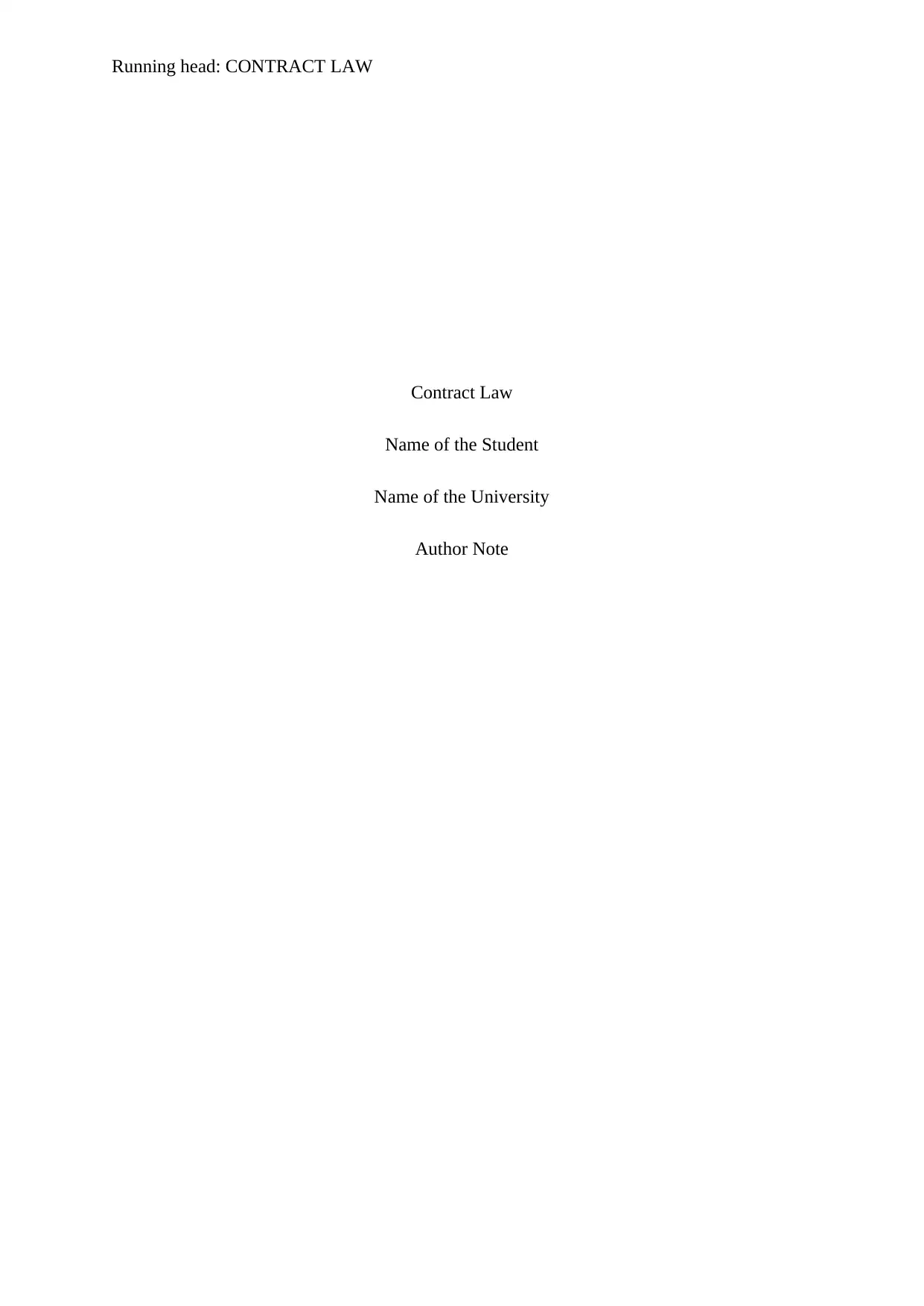
Running head: CONTRACT LAW
Contract Law
Name of the Student
Name of the University
Author Note
Contract Law
Name of the Student
Name of the University
Author Note
Paraphrase This Document
Need a fresh take? Get an instant paraphrase of this document with our AI Paraphraser
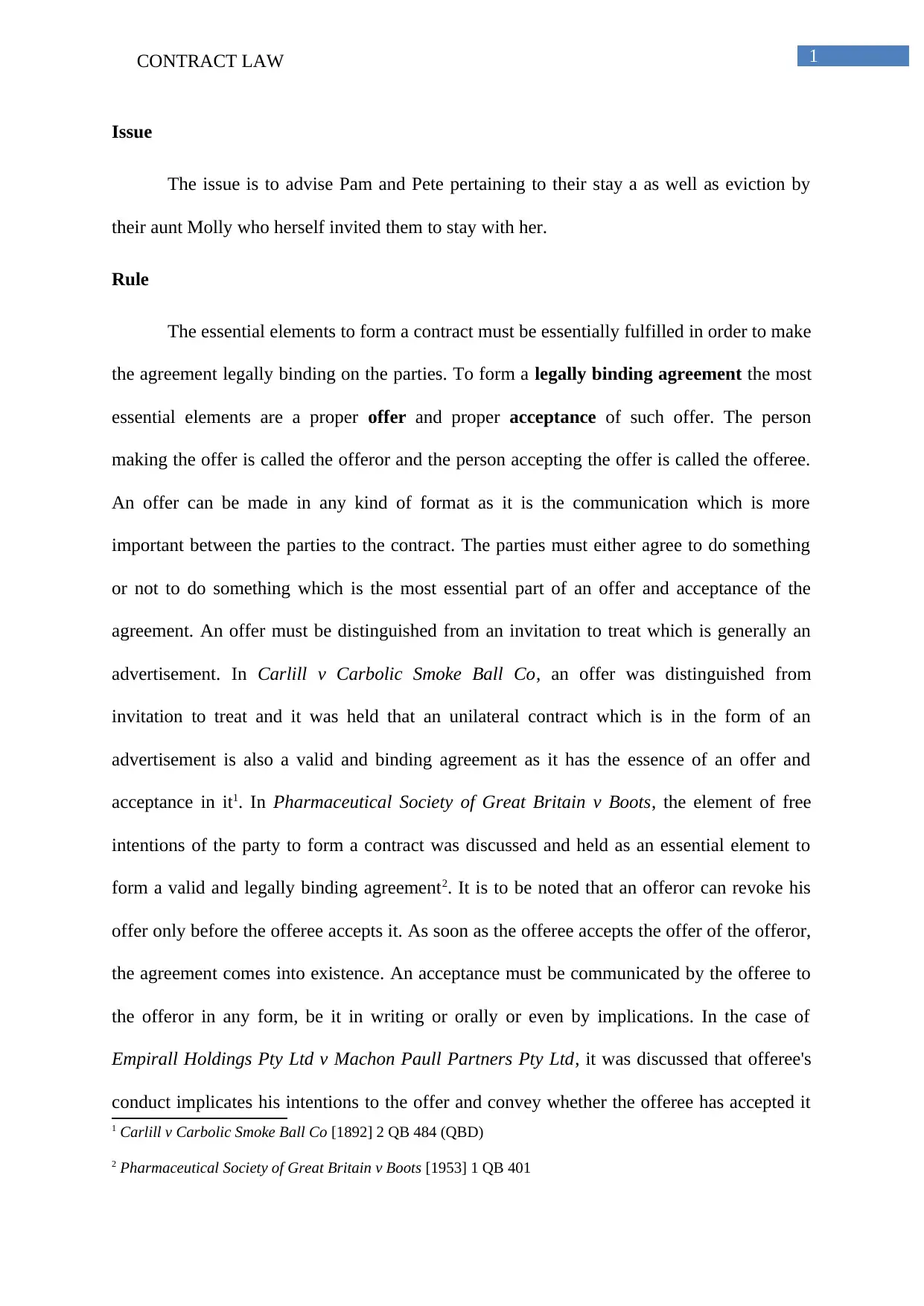
1CONTRACT LAW
Issue
The issue is to advise Pam and Pete pertaining to their stay a as well as eviction by
their aunt Molly who herself invited them to stay with her.
Rule
The essential elements to form a contract must be essentially fulfilled in order to make
the agreement legally binding on the parties. To form a legally binding agreement the most
essential elements are a proper offer and proper acceptance of such offer. The person
making the offer is called the offeror and the person accepting the offer is called the offeree.
An offer can be made in any kind of format as it is the communication which is more
important between the parties to the contract. The parties must either agree to do something
or not to do something which is the most essential part of an offer and acceptance of the
agreement. An offer must be distinguished from an invitation to treat which is generally an
advertisement. In Carlill v Carbolic Smoke Ball Co, an offer was distinguished from
invitation to treat and it was held that an unilateral contract which is in the form of an
advertisement is also a valid and binding agreement as it has the essence of an offer and
acceptance in it1. In Pharmaceutical Society of Great Britain v Boots, the element of free
intentions of the party to form a contract was discussed and held as an essential element to
form a valid and legally binding agreement2. It is to be noted that an offeror can revoke his
offer only before the offeree accepts it. As soon as the offeree accepts the offer of the offeror,
the agreement comes into existence. An acceptance must be communicated by the offeree to
the offeror in any form, be it in writing or orally or even by implications. In the case of
Empirall Holdings Pty Ltd v Machon Paull Partners Pty Ltd, it was discussed that offeree's
conduct implicates his intentions to the offer and convey whether the offeree has accepted it
1 Carlill v Carbolic Smoke Ball Co [1892] 2 QB 484 (QBD)
2 Pharmaceutical Society of Great Britain v Boots [1953] 1 QB 401
Issue
The issue is to advise Pam and Pete pertaining to their stay a as well as eviction by
their aunt Molly who herself invited them to stay with her.
Rule
The essential elements to form a contract must be essentially fulfilled in order to make
the agreement legally binding on the parties. To form a legally binding agreement the most
essential elements are a proper offer and proper acceptance of such offer. The person
making the offer is called the offeror and the person accepting the offer is called the offeree.
An offer can be made in any kind of format as it is the communication which is more
important between the parties to the contract. The parties must either agree to do something
or not to do something which is the most essential part of an offer and acceptance of the
agreement. An offer must be distinguished from an invitation to treat which is generally an
advertisement. In Carlill v Carbolic Smoke Ball Co, an offer was distinguished from
invitation to treat and it was held that an unilateral contract which is in the form of an
advertisement is also a valid and binding agreement as it has the essence of an offer and
acceptance in it1. In Pharmaceutical Society of Great Britain v Boots, the element of free
intentions of the party to form a contract was discussed and held as an essential element to
form a valid and legally binding agreement2. It is to be noted that an offeror can revoke his
offer only before the offeree accepts it. As soon as the offeree accepts the offer of the offeror,
the agreement comes into existence. An acceptance must be communicated by the offeree to
the offeror in any form, be it in writing or orally or even by implications. In the case of
Empirall Holdings Pty Ltd v Machon Paull Partners Pty Ltd, it was discussed that offeree's
conduct implicates his intentions to the offer and convey whether the offeree has accepted it
1 Carlill v Carbolic Smoke Ball Co [1892] 2 QB 484 (QBD)
2 Pharmaceutical Society of Great Britain v Boots [1953] 1 QB 401
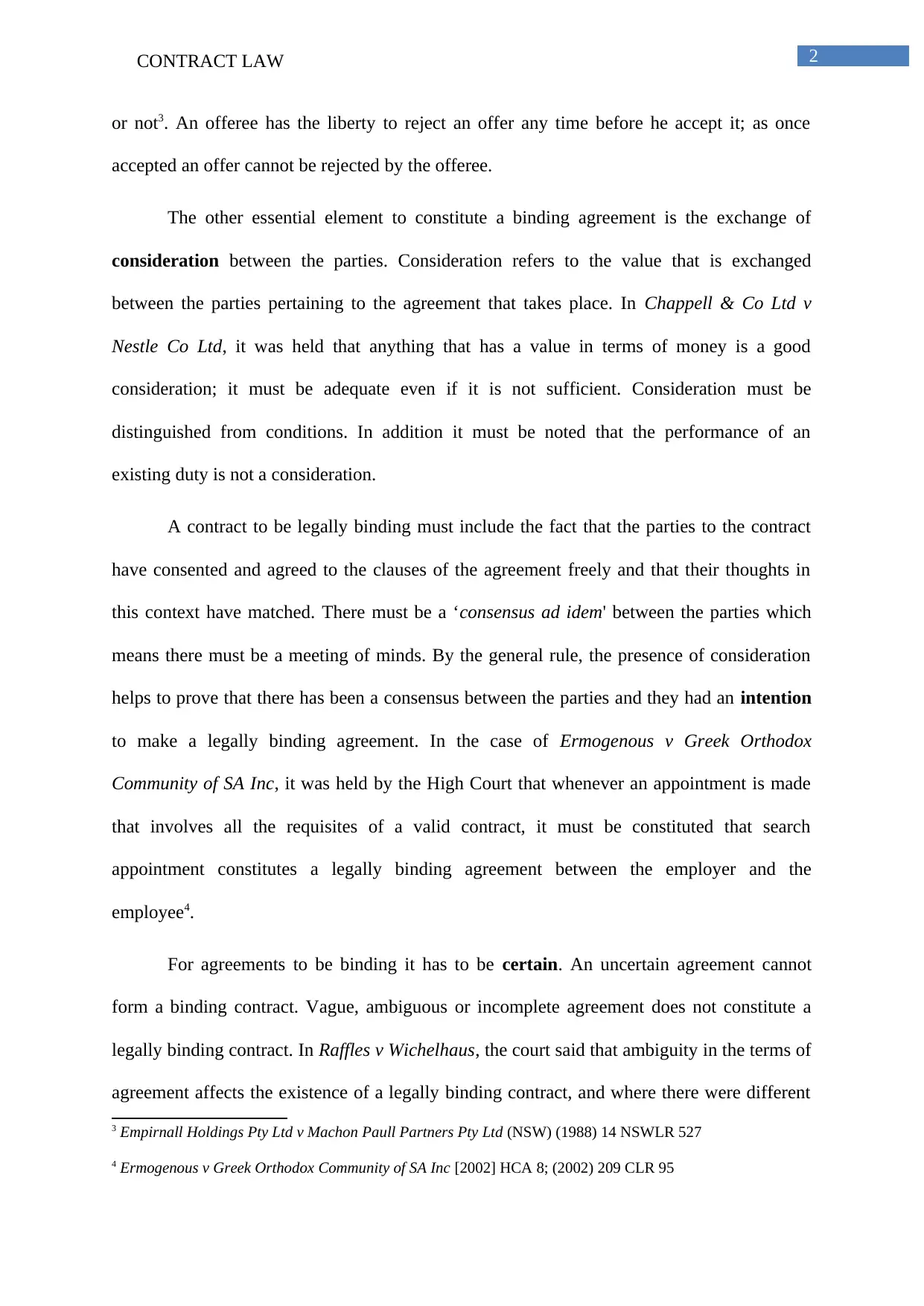
2CONTRACT LAW
or not3. An offeree has the liberty to reject an offer any time before he accept it; as once
accepted an offer cannot be rejected by the offeree.
The other essential element to constitute a binding agreement is the exchange of
consideration between the parties. Consideration refers to the value that is exchanged
between the parties pertaining to the agreement that takes place. In Chappell & Co Ltd v
Nestle Co Ltd, it was held that anything that has a value in terms of money is a good
consideration; it must be adequate even if it is not sufficient. Consideration must be
distinguished from conditions. In addition it must be noted that the performance of an
existing duty is not a consideration.
A contract to be legally binding must include the fact that the parties to the contract
have consented and agreed to the clauses of the agreement freely and that their thoughts in
this context have matched. There must be a ‘consensus ad idem' between the parties which
means there must be a meeting of minds. By the general rule, the presence of consideration
helps to prove that there has been a consensus between the parties and they had an intention
to make a legally binding agreement. In the case of Ermogenous v Greek Orthodox
Community of SA Inc, it was held by the High Court that whenever an appointment is made
that involves all the requisites of a valid contract, it must be constituted that search
appointment constitutes a legally binding agreement between the employer and the
employee4.
For agreements to be binding it has to be certain. An uncertain agreement cannot
form a binding contract. Vague, ambiguous or incomplete agreement does not constitute a
legally binding contract. In Raffles v Wichelhaus, the court said that ambiguity in the terms of
agreement affects the existence of a legally binding contract, and where there were different
3 Empirnall Holdings Pty Ltd v Machon Paull Partners Pty Ltd (NSW) (1988) 14 NSWLR 527
4 Ermogenous v Greek Orthodox Community of SA Inc [2002] HCA 8; (2002) 209 CLR 95
or not3. An offeree has the liberty to reject an offer any time before he accept it; as once
accepted an offer cannot be rejected by the offeree.
The other essential element to constitute a binding agreement is the exchange of
consideration between the parties. Consideration refers to the value that is exchanged
between the parties pertaining to the agreement that takes place. In Chappell & Co Ltd v
Nestle Co Ltd, it was held that anything that has a value in terms of money is a good
consideration; it must be adequate even if it is not sufficient. Consideration must be
distinguished from conditions. In addition it must be noted that the performance of an
existing duty is not a consideration.
A contract to be legally binding must include the fact that the parties to the contract
have consented and agreed to the clauses of the agreement freely and that their thoughts in
this context have matched. There must be a ‘consensus ad idem' between the parties which
means there must be a meeting of minds. By the general rule, the presence of consideration
helps to prove that there has been a consensus between the parties and they had an intention
to make a legally binding agreement. In the case of Ermogenous v Greek Orthodox
Community of SA Inc, it was held by the High Court that whenever an appointment is made
that involves all the requisites of a valid contract, it must be constituted that search
appointment constitutes a legally binding agreement between the employer and the
employee4.
For agreements to be binding it has to be certain. An uncertain agreement cannot
form a binding contract. Vague, ambiguous or incomplete agreement does not constitute a
legally binding contract. In Raffles v Wichelhaus, the court said that ambiguity in the terms of
agreement affects the existence of a legally binding contract, and where there were different
3 Empirnall Holdings Pty Ltd v Machon Paull Partners Pty Ltd (NSW) (1988) 14 NSWLR 527
4 Ermogenous v Greek Orthodox Community of SA Inc [2002] HCA 8; (2002) 209 CLR 95
⊘ This is a preview!⊘
Do you want full access?
Subscribe today to unlock all pages.

Trusted by 1+ million students worldwide
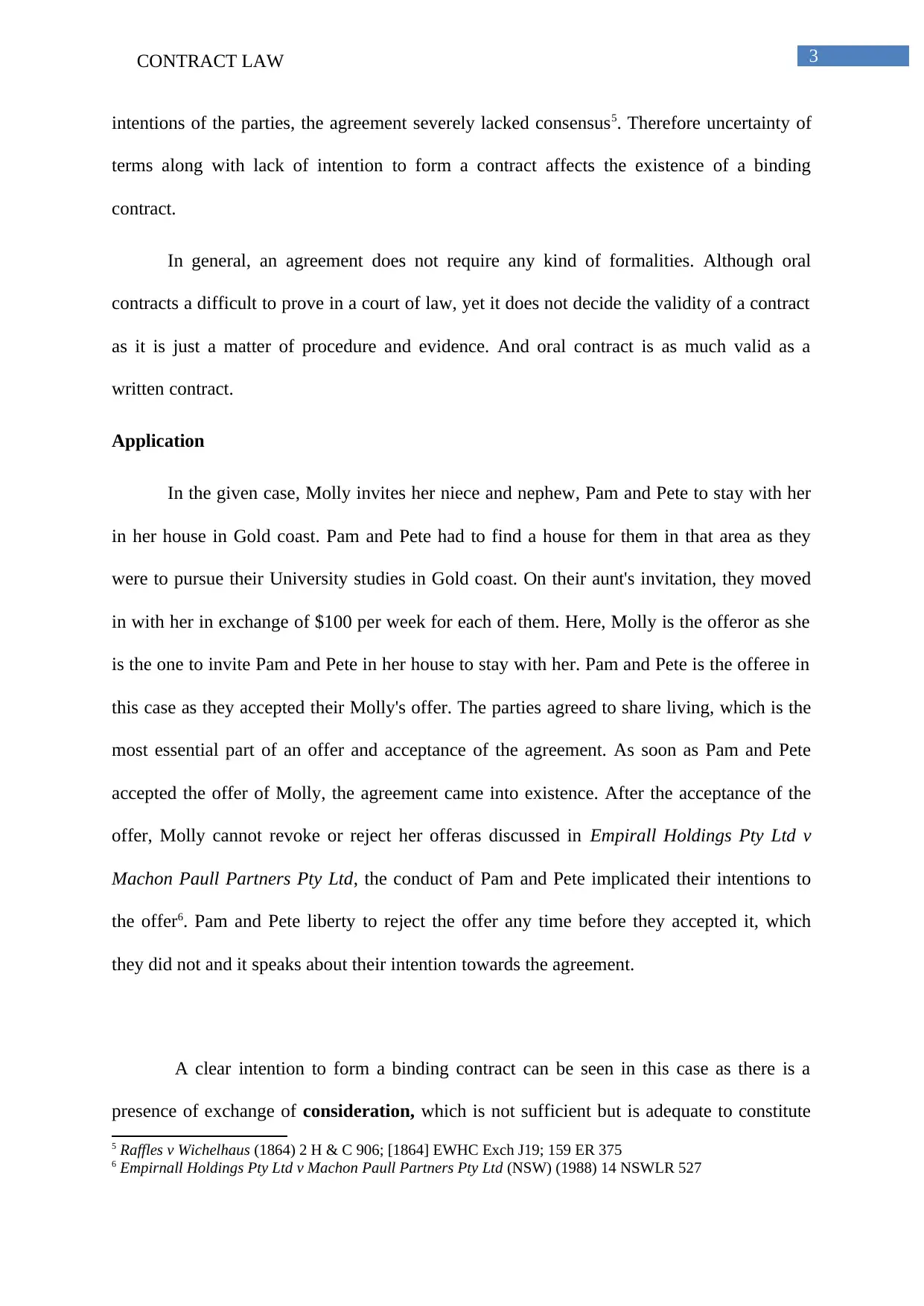
3CONTRACT LAW
intentions of the parties, the agreement severely lacked consensus5. Therefore uncertainty of
terms along with lack of intention to form a contract affects the existence of a binding
contract.
In general, an agreement does not require any kind of formalities. Although oral
contracts a difficult to prove in a court of law, yet it does not decide the validity of a contract
as it is just a matter of procedure and evidence. And oral contract is as much valid as a
written contract.
Application
In the given case, Molly invites her niece and nephew, Pam and Pete to stay with her
in her house in Gold coast. Pam and Pete had to find a house for them in that area as they
were to pursue their University studies in Gold coast. On their aunt's invitation, they moved
in with her in exchange of $100 per week for each of them. Here, Molly is the offeror as she
is the one to invite Pam and Pete in her house to stay with her. Pam and Pete is the offeree in
this case as they accepted their Molly's offer. The parties agreed to share living, which is the
most essential part of an offer and acceptance of the agreement. As soon as Pam and Pete
accepted the offer of Molly, the agreement came into existence. After the acceptance of the
offer, Molly cannot revoke or reject her offeras discussed in Empirall Holdings Pty Ltd v
Machon Paull Partners Pty Ltd, the conduct of Pam and Pete implicated their intentions to
the offer6. Pam and Pete liberty to reject the offer any time before they accepted it, which
they did not and it speaks about their intention towards the agreement.
A clear intention to form a binding contract can be seen in this case as there is a
presence of exchange of consideration, which is not sufficient but is adequate to constitute
5 Raffles v Wichelhaus (1864) 2 H & C 906; [1864] EWHC Exch J19; 159 ER 375
6 Empirnall Holdings Pty Ltd v Machon Paull Partners Pty Ltd (NSW) (1988) 14 NSWLR 527
intentions of the parties, the agreement severely lacked consensus5. Therefore uncertainty of
terms along with lack of intention to form a contract affects the existence of a binding
contract.
In general, an agreement does not require any kind of formalities. Although oral
contracts a difficult to prove in a court of law, yet it does not decide the validity of a contract
as it is just a matter of procedure and evidence. And oral contract is as much valid as a
written contract.
Application
In the given case, Molly invites her niece and nephew, Pam and Pete to stay with her
in her house in Gold coast. Pam and Pete had to find a house for them in that area as they
were to pursue their University studies in Gold coast. On their aunt's invitation, they moved
in with her in exchange of $100 per week for each of them. Here, Molly is the offeror as she
is the one to invite Pam and Pete in her house to stay with her. Pam and Pete is the offeree in
this case as they accepted their Molly's offer. The parties agreed to share living, which is the
most essential part of an offer and acceptance of the agreement. As soon as Pam and Pete
accepted the offer of Molly, the agreement came into existence. After the acceptance of the
offer, Molly cannot revoke or reject her offeras discussed in Empirall Holdings Pty Ltd v
Machon Paull Partners Pty Ltd, the conduct of Pam and Pete implicated their intentions to
the offer6. Pam and Pete liberty to reject the offer any time before they accepted it, which
they did not and it speaks about their intention towards the agreement.
A clear intention to form a binding contract can be seen in this case as there is a
presence of exchange of consideration, which is not sufficient but is adequate to constitute
5 Raffles v Wichelhaus (1864) 2 H & C 906; [1864] EWHC Exch J19; 159 ER 375
6 Empirnall Holdings Pty Ltd v Machon Paull Partners Pty Ltd (NSW) (1988) 14 NSWLR 527
Paraphrase This Document
Need a fresh take? Get an instant paraphrase of this document with our AI Paraphraser
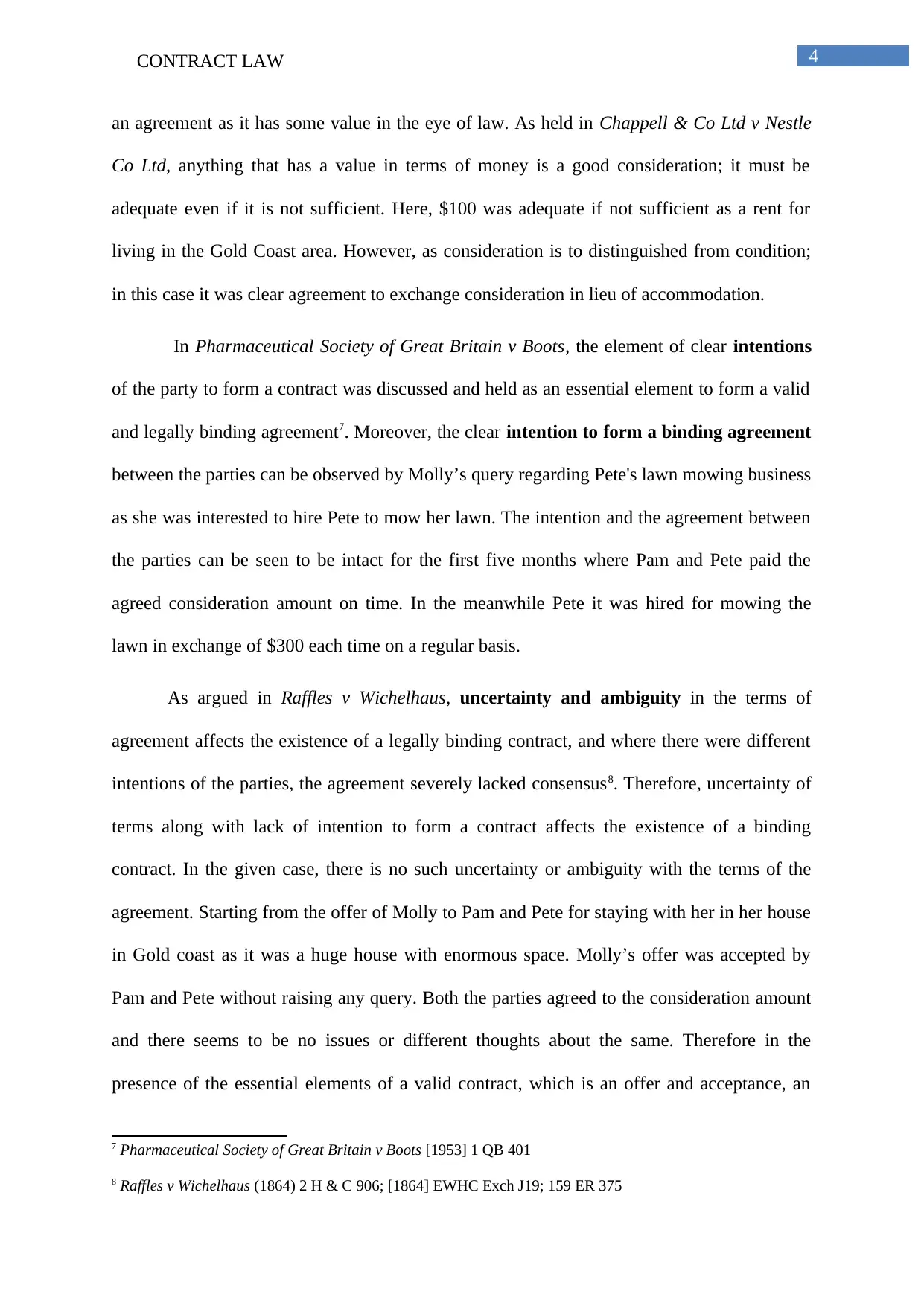
4CONTRACT LAW
an agreement as it has some value in the eye of law. As held in Chappell & Co Ltd v Nestle
Co Ltd, anything that has a value in terms of money is a good consideration; it must be
adequate even if it is not sufficient. Here, $100 was adequate if not sufficient as a rent for
living in the Gold Coast area. However, as consideration is to distinguished from condition;
in this case it was clear agreement to exchange consideration in lieu of accommodation.
In Pharmaceutical Society of Great Britain v Boots, the element of clear intentions
of the party to form a contract was discussed and held as an essential element to form a valid
and legally binding agreement7. Moreover, the clear intention to form a binding agreement
between the parties can be observed by Molly’s query regarding Pete's lawn mowing business
as she was interested to hire Pete to mow her lawn. The intention and the agreement between
the parties can be seen to be intact for the first five months where Pam and Pete paid the
agreed consideration amount on time. In the meanwhile Pete it was hired for mowing the
lawn in exchange of $300 each time on a regular basis.
As argued in Raffles v Wichelhaus, uncertainty and ambiguity in the terms of
agreement affects the existence of a legally binding contract, and where there were different
intentions of the parties, the agreement severely lacked consensus8. Therefore, uncertainty of
terms along with lack of intention to form a contract affects the existence of a binding
contract. In the given case, there is no such uncertainty or ambiguity with the terms of the
agreement. Starting from the offer of Molly to Pam and Pete for staying with her in her house
in Gold coast as it was a huge house with enormous space. Molly’s offer was accepted by
Pam and Pete without raising any query. Both the parties agreed to the consideration amount
and there seems to be no issues or different thoughts about the same. Therefore in the
presence of the essential elements of a valid contract, which is an offer and acceptance, an
7 Pharmaceutical Society of Great Britain v Boots [1953] 1 QB 401
8 Raffles v Wichelhaus (1864) 2 H & C 906; [1864] EWHC Exch J19; 159 ER 375
an agreement as it has some value in the eye of law. As held in Chappell & Co Ltd v Nestle
Co Ltd, anything that has a value in terms of money is a good consideration; it must be
adequate even if it is not sufficient. Here, $100 was adequate if not sufficient as a rent for
living in the Gold Coast area. However, as consideration is to distinguished from condition;
in this case it was clear agreement to exchange consideration in lieu of accommodation.
In Pharmaceutical Society of Great Britain v Boots, the element of clear intentions
of the party to form a contract was discussed and held as an essential element to form a valid
and legally binding agreement7. Moreover, the clear intention to form a binding agreement
between the parties can be observed by Molly’s query regarding Pete's lawn mowing business
as she was interested to hire Pete to mow her lawn. The intention and the agreement between
the parties can be seen to be intact for the first five months where Pam and Pete paid the
agreed consideration amount on time. In the meanwhile Pete it was hired for mowing the
lawn in exchange of $300 each time on a regular basis.
As argued in Raffles v Wichelhaus, uncertainty and ambiguity in the terms of
agreement affects the existence of a legally binding contract, and where there were different
intentions of the parties, the agreement severely lacked consensus8. Therefore, uncertainty of
terms along with lack of intention to form a contract affects the existence of a binding
contract. In the given case, there is no such uncertainty or ambiguity with the terms of the
agreement. Starting from the offer of Molly to Pam and Pete for staying with her in her house
in Gold coast as it was a huge house with enormous space. Molly’s offer was accepted by
Pam and Pete without raising any query. Both the parties agreed to the consideration amount
and there seems to be no issues or different thoughts about the same. Therefore in the
presence of the essential elements of a valid contract, which is an offer and acceptance, an
7 Pharmaceutical Society of Great Britain v Boots [1953] 1 QB 401
8 Raffles v Wichelhaus (1864) 2 H & C 906; [1864] EWHC Exch J19; 159 ER 375
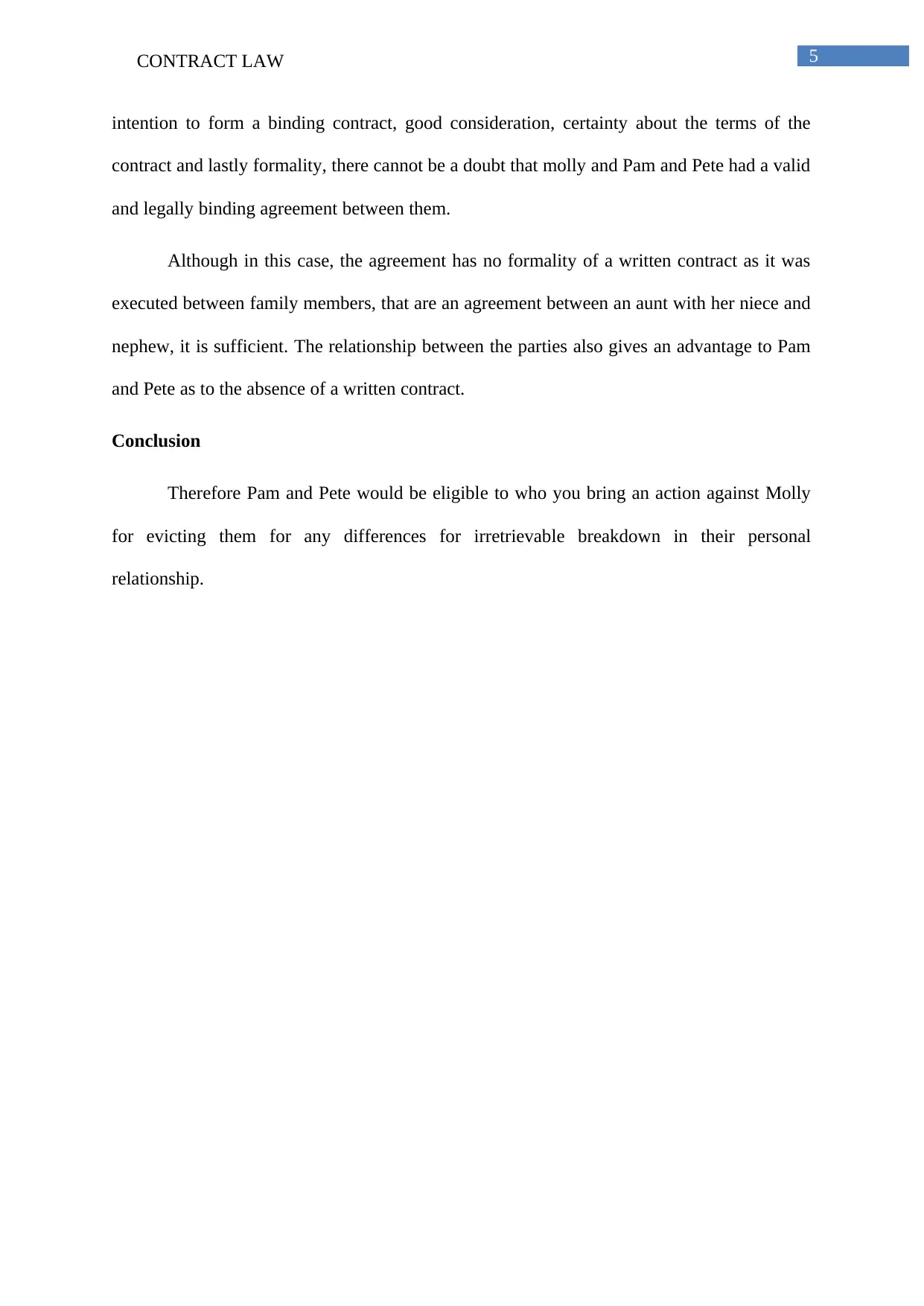
5CONTRACT LAW
intention to form a binding contract, good consideration, certainty about the terms of the
contract and lastly formality, there cannot be a doubt that molly and Pam and Pete had a valid
and legally binding agreement between them.
Although in this case, the agreement has no formality of a written contract as it was
executed between family members, that are an agreement between an aunt with her niece and
nephew, it is sufficient. The relationship between the parties also gives an advantage to Pam
and Pete as to the absence of a written contract.
Conclusion
Therefore Pam and Pete would be eligible to who you bring an action against Molly
for evicting them for any differences for irretrievable breakdown in their personal
relationship.
intention to form a binding contract, good consideration, certainty about the terms of the
contract and lastly formality, there cannot be a doubt that molly and Pam and Pete had a valid
and legally binding agreement between them.
Although in this case, the agreement has no formality of a written contract as it was
executed between family members, that are an agreement between an aunt with her niece and
nephew, it is sufficient. The relationship between the parties also gives an advantage to Pam
and Pete as to the absence of a written contract.
Conclusion
Therefore Pam and Pete would be eligible to who you bring an action against Molly
for evicting them for any differences for irretrievable breakdown in their personal
relationship.
⊘ This is a preview!⊘
Do you want full access?
Subscribe today to unlock all pages.

Trusted by 1+ million students worldwide
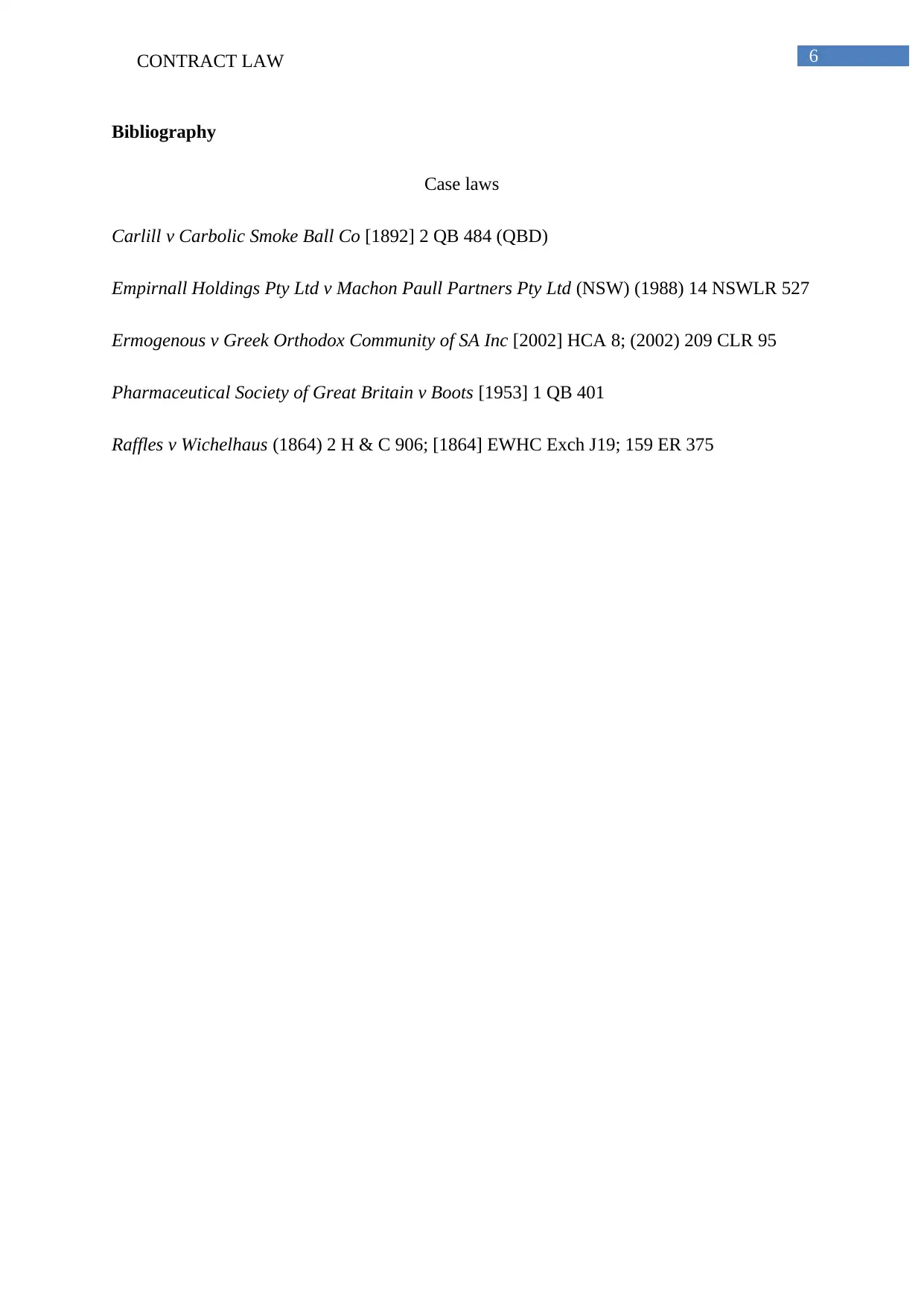
6CONTRACT LAW
Bibliography
Case laws
Carlill v Carbolic Smoke Ball Co [1892] 2 QB 484 (QBD)
Empirnall Holdings Pty Ltd v Machon Paull Partners Pty Ltd (NSW) (1988) 14 NSWLR 527
Ermogenous v Greek Orthodox Community of SA Inc [2002] HCA 8; (2002) 209 CLR 95
Pharmaceutical Society of Great Britain v Boots [1953] 1 QB 401
Raffles v Wichelhaus (1864) 2 H & C 906; [1864] EWHC Exch J19; 159 ER 375
Bibliography
Case laws
Carlill v Carbolic Smoke Ball Co [1892] 2 QB 484 (QBD)
Empirnall Holdings Pty Ltd v Machon Paull Partners Pty Ltd (NSW) (1988) 14 NSWLR 527
Ermogenous v Greek Orthodox Community of SA Inc [2002] HCA 8; (2002) 209 CLR 95
Pharmaceutical Society of Great Britain v Boots [1953] 1 QB 401
Raffles v Wichelhaus (1864) 2 H & C 906; [1864] EWHC Exch J19; 159 ER 375
1 out of 7
Related Documents
Your All-in-One AI-Powered Toolkit for Academic Success.
+13062052269
info@desklib.com
Available 24*7 on WhatsApp / Email
![[object Object]](/_next/static/media/star-bottom.7253800d.svg)
Unlock your academic potential
Copyright © 2020–2026 A2Z Services. All Rights Reserved. Developed and managed by ZUCOL.





